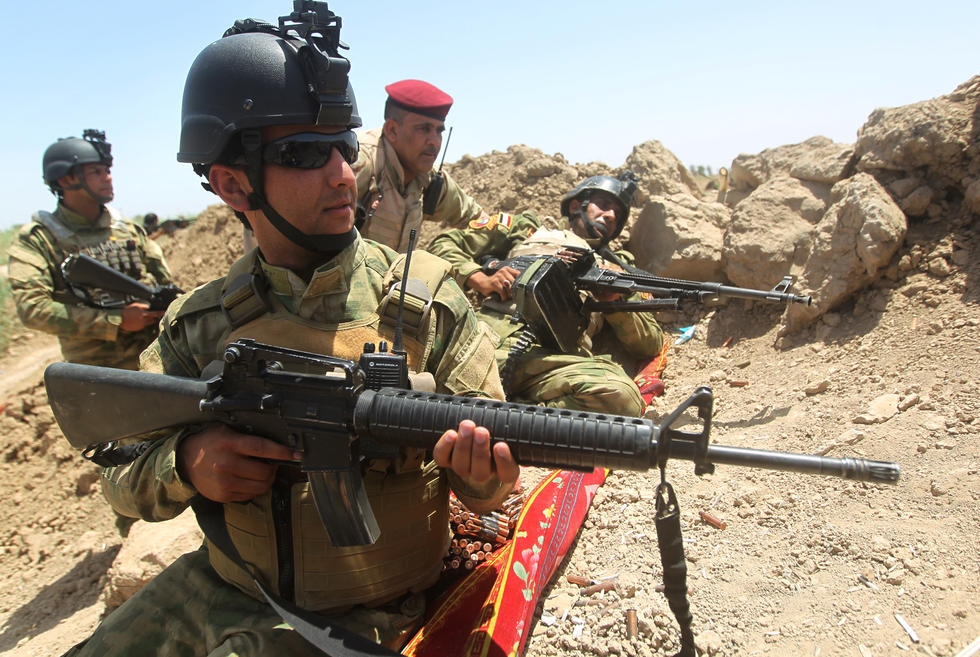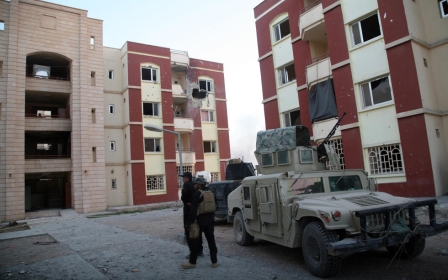Anbar police chief sacked after IS captures Ramadi

Iraq’s interior minister on Wednesday dismissed the police chief of Anbar province after IS stormed the provincial capital in a major loss for Baghdad.
The move is believed to be part of a bigger shake up in strategy, with the Iraqi government coming under fierce criticism for its policies and the reportedly inept performance of local security forces.
Interior Minister Mohammed al-Ghaban relieved Kadhim al-Fahdawi of his duties and appointed Major General Hadi al-Rzayej in his place, ordering him to choose a new headquarters and begin “reorganising the Anbar and Ramadi police” immediately.
The Iraqi cabinet said on Tuesday that while those who fought bravely to defend Ramadi should be honoured, it would severely punish “recalcitrants” or troublemakers.
IS took full control of the Anbar provincial capital on Sunday following a three-day blitz that ended with a chaotic retreat of government forces.
Video footage posted on social media as well as some accounts from fighters in Ramadi seemed to suggest that members of the Ramadi police deserted their posts at the height of the assault, days before IS eventually seized control.
According to UK's Telegraph newspaper, the army and police were holed up in the al-Malaab suburb for two days and did not fully engage in the fighting, in hopes that Baghdad would send in reinforcements.
The Golden Brigade commander Major-General Fadhil Barwari had requested permission from Prime Minister Haider al-Abadi to withdraw his forces, but it was only granted on the third day of the IS offensive, the paper added.
Khalid al-Alwani, a member of the Muttahidoon bloc made up of largely Sunni MPs, told the Middle East Eye earlier this week that Iraqi security forces deployed in Ramadi were inept at defending the city.
“The head of the operations units and the police chief are weak and incompetent and couldn’t save Ramadi, so how can we expect them to defend the other cities in Anbar?” he said.
US responds to fall of city
The US has also come under fire for the IS advance, with the militant group managing to take the city despite US bombardment.
In the wake of Ramadi’s fall, United States President Barack Obama met with officials to discuss the training and equipment of Sunni tribesmen in the Anbar province.
The meeting, which included the heads of the CIA, the Pentagon, the National Security Council staff and Secretary of State John Kerry, pledged to send military advisors to train 6,000 Sunni tribesmen.
“We are looking at how best to support local ground forces in Anbar,” the spokesperson for the National Security Council Alistair Baskey told AFP. “[This] will include accelerating the training and equipping of local tribes and supporting an Iraq-led operation to retake Ramadi.”
On Thursday, the US went further and said that it would send 1,000 anti-tank rockets to the Iraqi military to help combat massive suicide car and truck bombs utilised by IS during the Ramadi offensive.
The weapons are expected to arrive in June, although IS has been able to seize large caches of US-made weapons before in places like Mosul and now Ramadi.
“You’d have to be delusional not to take something like this and say, what went wrong and how do you fix it?” a senior State Department official, who spoke to reporters on the condition of anonymity, said late on Wednesday. “This is an extremely serious situation.”
An estimated 500 people have been killed in the city in the recent fighting, with the International Organisation for Migration estimating that 40,000 people have been displaced.
Many of them had congregated at the Bzeibez floating bridge to cross into Baghdad, but were barred from continuing any further by security forces which demanded that every family have a sponsor in the city.
While Baghdad used to be a mixed city, with large Sunni and Shiite populations, many Sunnis have fled the city in recent years.
“More than 2,000 people crossed Bzeibez between last night and noon today,” a police colonel said. “They are from Ramadi and other areas such as Khaldiya.”
According to medical and local officials, at least six people have died due to lack of medical care as they waited for Bzeibez Bridge to open.
Stay informed with MEE's newsletters
Sign up to get the latest alerts, insights and analysis, starting with Turkey Unpacked
Middle East Eye delivers independent and unrivalled coverage and analysis of the Middle East, North Africa and beyond. To learn more about republishing this content and the associated fees, please fill out this form. More about MEE can be found here.




